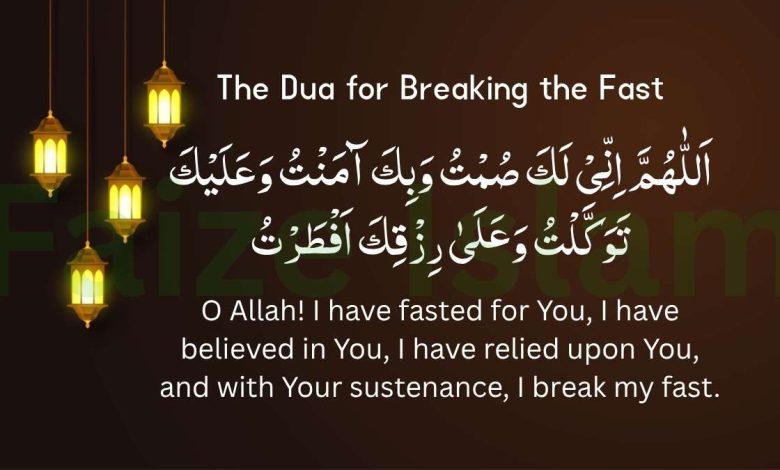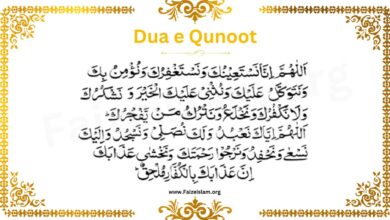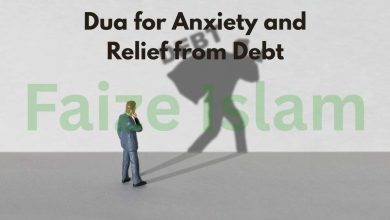The Dua for Breaking the Fast

The act of fasting, one of the Five Pillars of Islam, is a deeply spiritual practice observed by Muslims throughout the month of Ramadan. As the day of fasting comes to an end, the moment of breaking the fast holds great significance, not only for physical nourishment but also for spiritual reflection and connection with Allah.
A specific supplication (dua) recited at the time of breaking the fast carries a powerful reminder of this connection. One such dua is:
اَللّٰهُمَّ إِنِّي لَكَ صُمْتُ وَ بِكَ آمَنْتُ وَ عَلَيْكَ تَوَكَّلْتُ وَ عَلَىٰ رِزْقِكَ أَفْطَرْتُ
O Allah! I have fasted for You, I have believed in You, I have relied upon You, and with Your sustenance, I break my fast.
The Origins of the Dua
The dua for breaking the fast has been narrated in multiple hadiths, each mentioning variations of the words used. One such narration comes from Hazrat Muaz bin Zohra رضی اللّٰہ عنہ, who reported that when the Prophet Muhammad صلى الله عليه و سلم would break his fast, he would recite this dua:
اللَّهُمَّ لَكَ صُمْتُ وَعَلَىٰ رِزْقِكَ أَفْطَرْتُ
O Allah! I have fasted for You, and with Your sustenance, I break my fast. (Abu Dawood, Sunan, Book of Fasting, Chapter on Saying the Dua at the Time of Iftar, 2:294, Hadith No. 2358).
This beautiful supplication was recited to express gratitude for Allah’s sustenance and the opportunity to break the fast in His name. While the phrasing in different hadiths varies slightly, the core message remains the same: expressing reliance on Allah and acknowledging that it is only through His mercy that one can fast and break the fast.
The Scholars’ Insights on the Dua
The renowned scholar Mulla Ali Qari رضی اللّٰہ عنہ, in his commentary on Mirqat al-Mafatih, noted that while the words وَ بِكَ آمَنْتُ(I have believed in You) do not have an explicit origin in the standard versions of this dua, they are nevertheless acceptable and are a permissible addition to the supplication. He explained that adding words of supplication is allowed, just as some people add extra phrases during the talbiyah (the prayer recited during Hajj). Therefore, the following form of the dua can also be recited during iftar:
اللَّهُمَّ إِنِّي لَكَ صُمْتُ وَبِكَ آمَنْتُ وَعَلَيْكَ تَوَكَّلْتُ وَعَلَىٰ رِزْقِكَ أَفْطَرْتُ
O Allah! I have fasted for You, I have believed in You, I have relied upon You, and with Your sustenance, I break my fast.
The Significance of Reciting the Dua After Iftar
It is clear from various hadiths and the commentary of scholars that reciting a dua after breaking the fast is a practice rooted in the Sunnah of the Prophet صلى الله عليه و سلم. Imam Abu Dawood رضی اللّٰہ عنہ narrates that Hazrat Muaz bin Zohra رضی اللہ عنہ conveyed that the Prophet Muhammad صلى الله عليه و سلم would recite this dua at the time of iftar, after breaking the fast.
This is confirmed by the following narration:
It was conveyed to him that the Prophet صلى الله عليه وسلم used to say: O Allah! I have fasted for Your pleasure, and I break my fast with Your provision. (Sunan Abu Dawood, Volume 4, Page 40, Hadith No. 2358, Beirut Edition).
Imam Muhammad bin Abdul Latif (may Allah have mercy on him) and Imam Hussain bin Mahmood al-Mazahiri (may Allah have mercy on him), in their explanations of this hadith, clarified that this dua is to be recited after the fast is broken, i.e., after consuming dates or water to break the fast.
Conclusion
The dua for breaking the fast is a beautiful way to end a day of fasting, reminding the believer of their reliance on Allah for sustenance and spiritual strength. It serves as a moment of gratitude, acknowledging that all sustenance comes from Allah alone. As we strive to follow the Sunnah of the Prophet (صلى الله عليه وسلم), this supplication becomes not only a practice of worship but also a source of deep reflection during Ramadan.
FAQs
What is the purpose of the dua?
The dua expresses gratitude to Allah for providing sustenance and acknowledges reliance on Him for both the fast and its breaking.
Can I add other phrases to the dua for iftar?
Yes, as noted by scholars like Mulla Ali Qari, adding phrases like وَبِكَ آمَنْتُ (I have believed in You) is permissible and does not invalidate the dua.
When should the dua for breaking the fast be recited?
The dua should be recited after breaking the fast, typically after eating dates or drinking water, as this practice follows the Sunnah of the Prophet (صلى الله عليه وسلم).
Is the dua for iftar mentioned in all hadith books?
While various hadith books mention the dua with slight variations, the essence remains the same, emphasizing reliance on Allah and gratitude for His sustenance.
Can I use different wordings for the dua for iftar?
Yes, there are variations in the wording of the dua for breaking the fast, and all are accepted as long as they maintain the core message of reliance on Allah.




